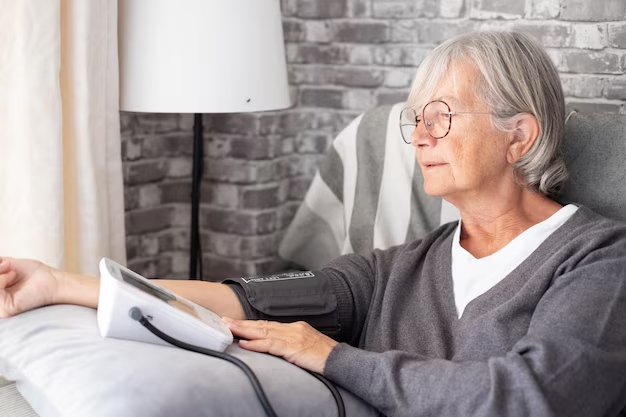Your Guide to What Is Hypertension Stage 1
What You Get:
Free Guide
Free, helpful information about HyperTension FAQ and related What Is Hypertension Stage 1 topics.
Helpful Information
Get clear and easy-to-understand details about What Is Hypertension Stage 1 topics and resources.
Personalized Offers
Answer a few optional questions to receive offers or information related to HyperTension FAQ. The survey is optional and not required to access your free guide.
Understanding Hypertension Stage 1: What You Need to Know
High blood pressure, or hypertension, is often called the "silent killer" because it can exist without noticeable symptoms, yet lead to serious health issues if not managed properly. Hypertension Stage 1 is an early phase of high blood pressure and understanding it can be the first step towards maintaining a healthy lifestyle.
What Is Hypertension Stage 1?
Hypertension is generally categorized into two stages, with Stage 1 being the initial level of elevated blood pressure. In this stage, your systolic pressure (the top number) ranges from 130 to 139 mmHg or your diastolic pressure (the bottom number) is between 80 to 89 mmHg.
Being in Stage 1 indicates that your heart is working harder than normal to pump blood throughout your body. Without intervention, this strain can lead to cardiovascular complications, including heart attack or stroke.
Symptoms and Risk Factors
Many people with Hypertension Stage 1 do not experience noticeable symptoms, which can make it challenging to catch early without regular health check-ups. However, some may encounter headaches, dizziness, or blurred vision.
Key risk factors include:
- Age and Genetics: Family history plays a significant role.
- Lifestyle Choices: Unhealthy diet, excessive salt intake, lack of physical activity.
- Excessive Alcohol and Tobacco Use: Both greatly impact blood pressure.
- Stress: Chronic stress can contribute to elevated blood pressure levels.
Management and Treatment
To effectively manage and potentially reverse Hypertension Stage 1, lifestyle changes are crucial:
- Dietary Adjustments: Eating a balanced diet rich in fruits, vegetables, and whole grains can improve heart health.
- Regular Physical Activity: Engage in at least 150 minutes of moderate exercise weekly.
- Weight Management: Losing excess weight can significantly reduce blood pressure.
- Stress Management: Techniques like yoga or meditation can help lower stress levels.
In some cases, healthcare providers might prescribe medications to help manage blood pressure. It's important to follow their guidance and have regular follow-ups to adjust treatment as necessary.
Why Consider Financial and Educational Resources?
Confronting hypertension not only involves awareness and medical support but also highlights the importance of financial preparedness and educational resources for a healthy future. Managing healthcare expenses and accessing support can ease the burden on individuals living with chronic conditions.
Explore Available Financial Resources:
- Government Aid Programs: Available for those needing assistance with healthcare costs.
- Medical Debt Relief Options: For individuals facing overwhelming medical bills.
- Education and Scholarships: Opportunities for healthcare education to better understand and manage health conditions.
Taking advantage of these resources can alleviate stress and allow you to focus more on taking care of your health.
Financial and Educational Opportunities to Support Your Health Journey
- 💰 Medicare and Medicaid: Financial aid for eligible individuals.
- 👩🏫 Educational Grants: Scholarships for wellness and health management courses.
- 🏆 Debt Management Programs: Support for consolidating and reducing debt.
- 📚 Community Health Workshops: Free local classes and seminars on heart health and lifestyle changes.
- 💳 Low-Interest Medical Loans: Options to manage unforeseen medical costs.
By integrating a health-conscious lifestyle with available resources, it's possible to effectively manage Hypertension Stage 1 and improve overall well-being. Stay informed, proactive, and supported on your journey to health.
What You Get:
Free HyperTension FAQ Guide
Free, helpful information about What Is Hypertension Stage 1 and related resources.

Helpful Information
Get clear, easy-to-understand details about What Is Hypertension Stage 1 topics.

Optional Personalized Offers
Answer a few optional questions to see offers or information related to HyperTension FAQ. Participation is not required to get your free guide.


Discover More
- a 66 Year Old Female With a History Of Hypertension
- Are Eggs Bad For Hypertension
- Are Eggs Good For Hypertension
- Are Endocrine Disorders Causing Hypertension Rare
- Can Adderall Cause Hypertension
- Can Alcohol Cause Hypertension
- Can Allergies Cause Hypertension
- Can Anemci People Get Hypertension
- Can Anemia Cause Hypertension
- Can Antibiotics Cause Hypertension
